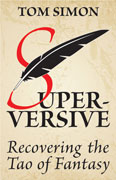As Nate Winchester observes, George R. R. Martin ‘famously said something about wanting to know Aragorn’s tax policy’. Evidently Martin thinks this was one of the necessary nuts and bolts of worldbuilding that the inferior and unworldly Tolkien, with his head in the clouds and dreaming of unrealistic heroes, never would have thought of. This is bunk.
I can tell you Aragorn’s tax policy in seven words that used to be famous in England, and that Tolkien certainly knew well:
‘The King shall live of his own.’
Meaning, the daily expenses of government are met by the income of the royal estates, without direct taxation. In wartime, the King depends upon his people to fulfil their feudal obligations and report for unpaid (short-term) military service.
There are hints here and there that Gondor was an analogue of Byzantium, which would mean that nobles like Prince Imrahil were equivalent to the strategoi who commanded Byzantine themes. Each theme had a certain amount of good farmland set aside to support the troops stationed there. Unlike feudal knights, those troops lived and worked on their own land; they might have a tenant family or two to help out. Also, unlike feudal knights, the troops owed their land title and their allegiance directly to the emperor and not to intermediate lords.
In Byzantium, the thematic soldiers were paid an allowance for their equipment and other expenses, which was raised from various kinds of taxes. In countries with an actual feudal system, no such payment was customarily made, and individual soldiers had somewhat larger land holdings so they could sell or barter their surplus instead. The Old English model of the fyrd especially commended itself to Tolkien’s imagination; he used it as the basis of the army of Rohan, but I am sure he had something similar in mind for Gondor.
You must then picture Gondor as defended by an army of sturdy yeomen, captained by the lords of the various ‘fiefs’ but owing their allegiance to the King or Steward. Each yeoman would have a bit of land big enough to support, say, four or five peasant families besides his own, so the crops would not fail when he went to war, and the surplus could pay for his gear, including horses if he was a cavalryman. The weakness of the system, of course, is that those men would likely stay home if their homes were directly threatened: which is why Denethor could only raise a tenth of the nominal strength of his army when Sauron attacked Minas Tirith. Neither law nor custom compelled the men of Gondor to let the Corsairs burn their farms and villages.
The ‘Free Men of the West’ were free to a degree that modern people would find astonishing, but mediaeval European freemen would have regarded as an ideal that their rulers (being human) fell short of but were obliged to honour as best they could.








Recent Comments